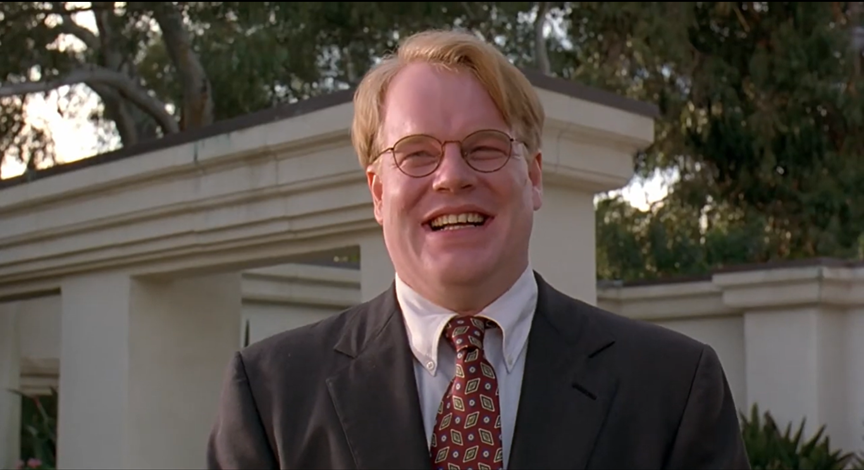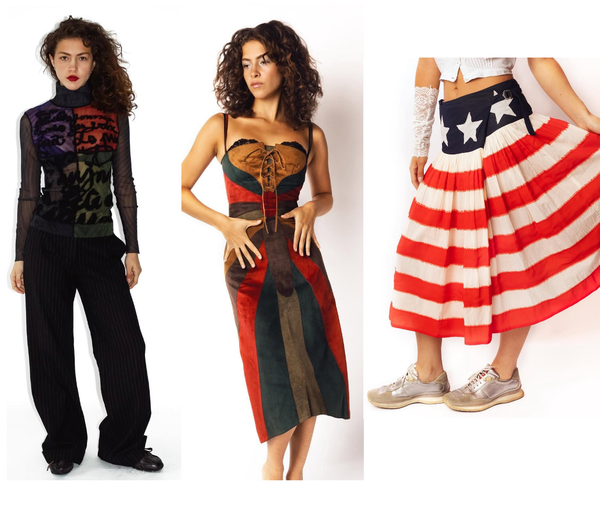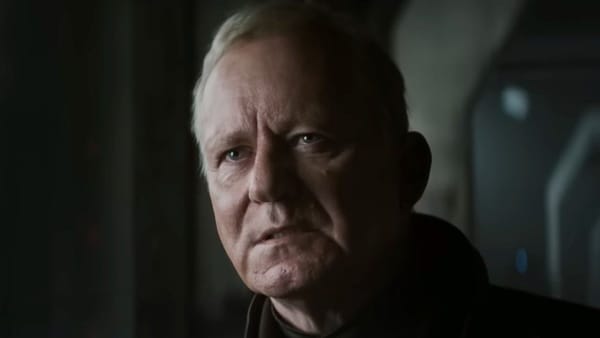An Ode to Philip Seymour Hoffman’s Performance in The Big Lebowski
There are no small parts, only small actors. Philip Seymour Hoffman's six and a half minutes as an exasperated henchman in The Big Lebowski is a case study of the maxim.

One would be forgiven for not thinking of Philip Seymour Hoffman when considering the memorable performances in the Coen Brothers’ 1998 classic The Big Lebowski. Jeff Bridges’ laid-back, ever-bewildered performance as The Dude is iconic, as is John Goodman’s bottomless rage as Walter. Even among the film’s minor characters, there are performances like John Turturro’s as bowling afficionado and registered sex offender Jesus Quintana that gather more attention that Hoffman’s. For those struggling to remember, Philip Seymour Hoffman plays Brandt, the polite and well-dressed lackey of the Big Lebowski. His character is largely a straight man within the film’s comedic scheme and lacks the immediate eccentricity of most of its other characters. But Hoffman’s embodiment of him is proof of the maxim that there are no small parts, only small actors. It is one of the few performances I have seen where an actor truly maximizes every single moment their character is on screen.
Those moments for Brandt are quite few. He is by all measures a minor character, whose primary function is to deliver exposition. He appears in six scenes, plus one scene where his voice is heard over the phone, all but one of which occur in the film’s first half. He has 6 minutes and 29 seconds of total screen time. He gets 41 lines, which add up to 568 total words spoken. (Fun fact: that’s still almost 200 words more than Keanu Reeves spoke in the nearly three hours of John Wick: Chapter 4.) But every single one of them is gold.
Before diving into analysis of the performance and character, let me briefly enumerate some of my favorite Brandt moments. There is his highly uncomfortable forced laugh in the early scene where Bunny offers The Dude oral sex for a thousand dollars. There is the grandiosity with which he opens the doors to the Big Lebowski’s study and the solemn lachrymosity with which he hangs his head as the Big Lebowski proclaims, “Strong men also cry.” The magnum opus of nonverbal performance comes in the limo scene in the middle of the film, with his squirmy expression and posture while The Dude and the Big Lebowski verbally spar. And then there are his many great lines, unimpressive on the page but with sparkling comedic delivery. They include: “Well, Dude, we just don’t know,” “Her life is in your hands, Dude,” “This is our concern, Dude,” and “We had not considered that, Dude.”
Considering the character on the whole, what stands out the most is his uniqueness among the film’s cast, particularly regarding the way he presents himself. He is an obvious foil to The Dude. Where The Dude perpetually dresses in a t-shirt and shorts, occasionally accompanied by a bathrobe, Brandt is always seen in a buttoned-up suit. Where The Dude speaks in profanity-laced slang, Brandt speaks with a clear enunciation on every word. The contrast between their manner of speaking is highlighted explicitly in one exchange regarding the film’s inciting incident with The Dude’s rug. Brandt talks of the people who “soiled your rug,” The Dude refers to them as the “carpet-pissers.” In a film mostly populated by grifters and assholes, Brandt is the only character who seems to care at all about politeness and professionalism.
Accompanying Brandt’s well-kept, tightly-mannered presentation is the utter seriousness with which he takes his job. This is most evident in his general grandiosity as well as his constant harriedness. Brandt seems perpetually stressed by having to manage the Big Lebowski’s affairs, and the ongoing antics of Bunny and The Dude only make his life more difficult. In contrast to the chill demeanor of The Dude, Brandt always behaves as though whatever task has been thrust on him is the most important thing in the world. He is the Smithers to the Big Lebowski’s Mr. Burns, devoted to his boss to a comical degree. (It’s left unclear, though, whether Brandt has the same feelings for his boss Smithers has for his.) Brandt is as ridiculous a character as any other in the film, it’s just that his ridiculousness is in how thoroughly he commits to being the straight man in a world that clearly has no use for one.
Behind this ultra-serious, ultra-professional façade Brandt gives us which is more than sufficient for the character’s comedic purposes, there is some depth to be found. One of the most notable traits of Brandt I have yet to mention is the fact that in pointed contrast to his boss, Brandt shows The Dude enough respect to address him by his preferred nomenclature. This serves several purposes. On one level, it is what makes those lines mentioned above so comedic – the fact that this millionaire’s assistant who always wears a suit is willing to address someone solely as “The Dude.” It also demonstrates the character’s unyielding commitment to professionalism. But beyond that, it also serves as a subtle indicator of Brandt’s place on the social hierarchy. Brandt has to call The Dude The Dude because he does not have the power to disrespect him by using his Christian name.
There are two worlds contrasted in The Big Lebowski: the world of “serious people,” epitomized by the title character and his emphasis on success and achievement, and the unserious world of The Dude and his buddies, people who want nothing more than to get their rug back and go bowling. Brandt bridges the two worlds. He seems at first to squarely belong to the serious world, to the affluent world of the Big Lebowski, but it is clear upon examination that no matter how hard he tries, no matter how much of a front he puts up, he does not really belong to that world. Brandt, in his wardrobe, his forced enunciation, his grandiosity, projects affluence as much as he can. But the characters who actually belong to the affluent class – the Big Lebowski, Maude, Jackie Treehorn – do not need to project it. They just let their power speak for itself. They do not need to be respectful to The Dude because The Dude is nothing to them. The Big Lebowski repeatedly calls The Dude a bum. The Malibu Police Chief calls him a jerk-off four times in one sentence. Jackie Treehorn might feign respect for The Dude and use the correct nomenclature, but it is all a front to drug him and ransack his apartment. Even Maude, who is ostensibly The Dude’s ally, insists on calling him Jeffrey and uses him purely as an object to conceive a child. Brandt’s professionalism towards The Dude does not signal him as a member of the upper class, it betrays that he is not really a part of it.
What we have in Brandt is a man likely from a middle-class background who is desperately trying to wedge his way into the world of the elite. He has found a job that lets him exist around that world, and has convinced himself that if he commits enough to the job, if he dresses well enough and is professional enough and shows enough dedication, then he can outperform his lackey status and truly become a part of the class he now serves. The question that most often comes up around Brandt is whether he is truly dedicated to the Big Lebowski, or whether his politeness and devotion is all a front. I think it’s both. Brandt is so dead-set on becoming like the Big Lebowski that he has convinced himself that he must be truly devoted to him. He has put up the front so strongly that he has started to believe it. When we cut to his face on the Big Lebowski’s “strong men also cry” line, I thought the first few times I saw the film that Brandt was actually crying, overcome with emotion at the Big Lebowski’s speech. My most recent watch, though, I realized something even funnier was happening: Brandt was trying, unsuccessfully, to make himself cry. Brandt is the character in the film who may be the ultimate antithesis to The Dude: a man outside the successful, serious world who has sacrificed all his individuality in the vain hope of getting into it. Brandt could take some of The Dude’s medicine, and learn to abide.
No doubt, Philip Seymour Hoffman in his tragically short life gave many performances with more acclaim and gravitas than his bit part as Brandt: as Truman Capote, as death-obsessed theatre director Caden Cotard, as cult leader Lancaster Dodd. But one measure of a great actor is what they do not with roles that give them a whole script’s worth of depth and development and the opportunity for award-show monologues and emotional outbursts, but with roles that give them little material to work with and little screen or stage time to work with it, how they can transform a character who is an afterthought on the page into one who is unforgettable on the stage (or screen, in this case. Damn the medium for messing up that rhyme!) Hoffman could do both, and in his six-and-a-half minutes on screen in The Big Lebowski he showed it, giving a masterful performance that really tied the film together.
For less than a dollar a day, unlock full access to our site and support independent creative journalism. Your membership helps us continue telling the stories that matter. Try it free now for 7 days.




